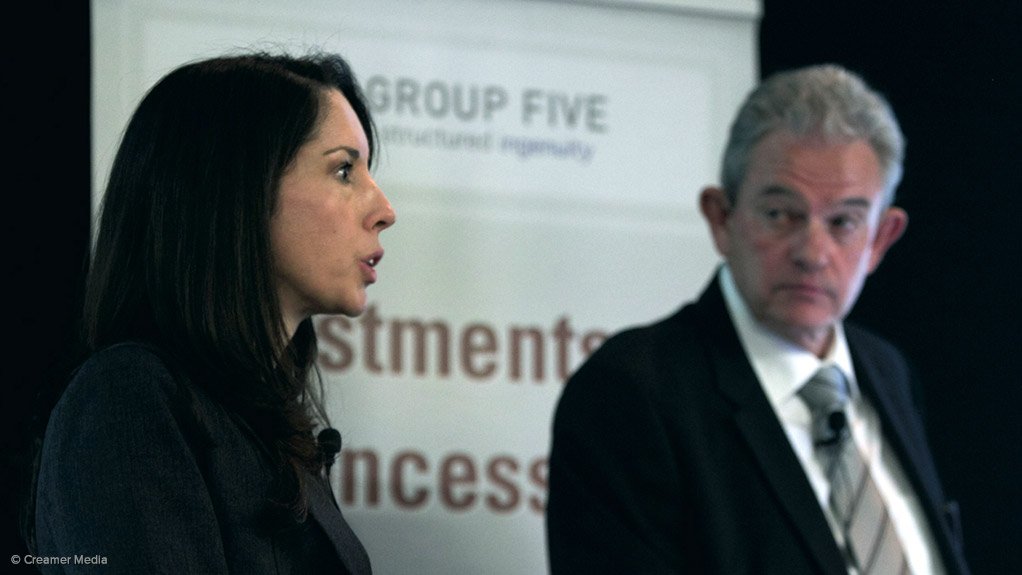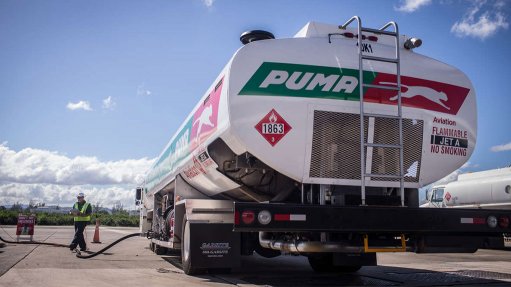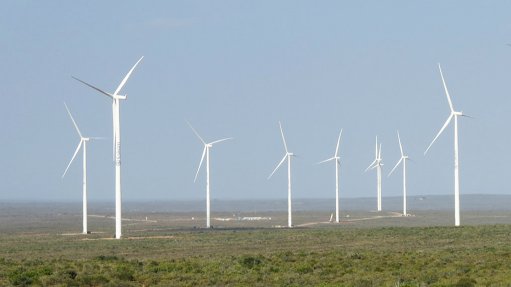Group Five loses 78 500 workdays to strikes; CompCom cases not yet settled
Workdays lost in 2013 as a result of industrial action at Group Five had increased by roughly 30% over 2012, to 78 465 days, said Group Five human resources director Junaid Allie on Monday.
Speaking at a media round table in Johannesburg, he noted that 7 487 people participated in industrial action at the group’s various businesses this year.
Only two of the 16 strikes were legal.
There had been a general increase in unreasonable demands and a disregard for current binding collective agreements, he added.
Wage settlements reached throughout the year averaged an increase of between 8% and 10%.
Union membership had been decreasing, however, noted Allie, with 19% of Group Five employees, or 2 416 people, members of a union in the 2010 financial year, and 15%, or 2 120 people, members of a union in the 2013 financial year.
This decline happened in the face of an increase in the number of unions Group Five had to engage with – from five in 2009, to ten in 2013.
Allie said the decrease in membership could be attributed to several factors, such as a younger workforce willing and wanting to “go it on their own”, a desire to maximise income and not pay union fees, as well as the fact that certain unions had recently fallen out of public favour.
With such a large percentage of the workforce not unionised, Group Five had been forced to encourage the appointment of worker representatives to communicate the demands of workers to management.
These workers representatives must then also be educated on the relevant labour legislation, such as the Basic Conditions of Employment Act.
Allie said the number of strikes in the construction industry had been increasing as demands to lift standards of living surged. Some service delivery protests in communities were also spilling over into the workplace.
This meant the company had to engage with the local community as well when executing projects, while it also ensured that Group Five made use of local labour wherever possible.
Employment at the construction and engineering group had been growing steadily since June 2012, with full-time employees in June 2013 at 5 996 people, up from 5 333 in June 2012. Part-time employees increased from 5 081 to 7 663 from 2012 to 2013.
FOUR CASES NOT YET SETTLED
Group Five had not yet settled its four outstanding cases with the Competition Commission, said CFO Cristina Teixeira.
The commission earlier this year imposed R1.46-billion in penalties on 15 companies in the industry for collusive tendering related to projects concluded between 2006 and 2011.
Group Five, as a whistleblower on these collusive practices, had been granted leniency by the commission on all 25 of its submissions.
However, despite its cooperation over a period of four years, the group earlier this year received notice from the commission that it intended to fine the group for infringements on four projects in which it was implicated and for which no leniency was granted.
Teixeira said Group Five was not unwilling to settle, provided the terms were reasonable.
It was not yet clear that the penalty payable would be, but Group Five had made provision for a fine, she added.
As for civil claims flowing from the Competition Commission investigation, Teixeira said the group had “not received any formal civil claim” from its clients.
Group Five CEO Mike Upton reiterated on Monday that the Competition Commission enquiry had damaged the reputation of South Africa’s construction industry.
He said government wanted a construction industry that embraced transformation and acted ethically.
“We need to reach out and find each other.”
Upton said any mending of fences – “a work in progress” – would most likely need to occur through industry bodies such as Master Builders South Africa or the South African Federation of Civil Engineering Contractors, on industry’s side, and government’s Department of Public Works.
Comments
Announcements
What's On
Subscribe to improve your user experience...
Option 1 (equivalent of R125 a month):
Receive a weekly copy of Creamer Media's Engineering News & Mining Weekly magazine
(print copy for those in South Africa and e-magazine for those outside of South Africa)
Receive daily email newsletters
Access to full search results
Access archive of magazine back copies
Access to Projects in Progress
Access to ONE Research Report of your choice in PDF format
Option 2 (equivalent of R375 a month):
All benefits from Option 1
PLUS
Access to Creamer Media's Research Channel Africa for ALL Research Reports, in PDF format, on various industrial and mining sectors
including Electricity; Water; Energy Transition; Hydrogen; Roads, Rail and Ports; Coal; Gold; Platinum; Battery Metals; etc.
Already a subscriber?
Forgotten your password?
Receive weekly copy of Creamer Media's Engineering News & Mining Weekly magazine (print copy for those in South Africa and e-magazine for those outside of South Africa)
➕
Recieve daily email newsletters
➕
Access to full search results
➕
Access archive of magazine back copies
➕
Access to Projects in Progress
➕
Access to ONE Research Report of your choice in PDF format
RESEARCH CHANNEL AFRICA
R4500 (equivalent of R375 a month)
SUBSCRIBEAll benefits from Option 1
➕
Access to Creamer Media's Research Channel Africa for ALL Research Reports on various industrial and mining sectors, in PDF format, including on:
Electricity
➕
Water
➕
Energy Transition
➕
Hydrogen
➕
Roads, Rail and Ports
➕
Coal
➕
Gold
➕
Platinum
➕
Battery Metals
➕
etc.
Receive all benefits from Option 1 or Option 2 delivered to numerous people at your company
➕
Multiple User names and Passwords for simultaneous log-ins
➕
Intranet integration access to all in your organisation





















